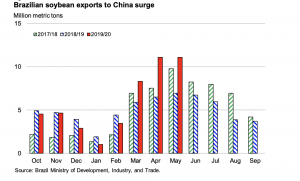A new 10% tariff on goods from around the world took effect Tuesday — with a list of exemptions including beef. Other exemptions affecting the food and agriculture industries include…
USTR Lighthizer Defends Phase One Trade Deal, Expects China to Fulfill Its Promise
Ana Swanson reported in today’s New York Times that, “The Trump administration’s top trade negotiator defended the president’s economic agreement with China on Wednesday, saying that Beijing was buying more American products and had reaffirmed its commitment to live up to the deal.
“In remarks to Congress, Robert E. Lighthizer, the United States trade representative, instead reserved his harshest criticism for the World Trade Organization, which he called ‘a mess,’ and the European Union, which he said could face tariffs if it did not agree to a trade deal.
“Mr. Lighthizer said his office was closely tracking China’s purchases of American goods, which were agreed to in a pact in January, and was in frequent contact with Chinese officials. China has committed to buying an additional $200 billion of American products by the end of next year. That is a goal many analysts said was unrealistic even before the pandemic, which has suppressed consumer demand, disrupted supply chains and caused a crash in oil prices, resulting in purchases that are even lower than anticipated.”
‘Every indication is that in spite of this Covid-19, they are going to do what they say,’ Mr. Lighthizer said of the Chinese.
Today’s article noted that, “Mr. Lighthizer also praised the administration’s trade record, including new or revised deals it has signed with Japan, Canada and Mexico that he said had improved the terms of trade for American farmers and businesses. And he said that a comprehensive trade deal with the United Kingdom was just a matter of time, though it was not likely to be concluded before the election in November.”
At the @WaysandMeansGOP hearing with @USTradeRep Lighthizer today, I discussed the implementation of the Phase One trade deal with China and the important work the #ChinaTaskForce is doing to strengthen our economic competitiveness. Watch ⬇️ pic.twitter.com/S3QqHLLynX
— Darin LaHood (@RepLaHood) June 17, 2020
Ms. Swanson added that, “But [Amb. Lighthizer] was more circumspect on the potential for a deal with another big partner, the European Union, which he accused of ‘thinly veiled protectionism’ for rejecting American agricultural products over alleged safety concerns. A deal with the European Union is ‘not looking good in the short term,’ Mr. Lighthizer said, adding that ‘the president will use tariffs if he has to to get a fair shake for American businesses.’
“Mr. Lighthizer defended the administration’s aggressive use of tariffs and rebuffed requests from various lawmakers to reduce or defer the levies it charges on products imported by people or businesses in their districts, in order to reduce costs on businesses that are struggling with the pandemic.”
Thank you @USTradeRep for restating your commitment to prioritizing US ag in all negotiations - including the UK - at the @WaysMeansGOP hearing this morning. We must continue to lower trade barriers for our farmers and ranchers! pic.twitter.com/9Jihz4Zsl2
— Rep. Adrian Smith (@RepAdrianSmith) June 17, 2020
Writing in today’s Washington Post, David J. Lynch reported that, “U.S. Trade Representative Robert E. Lighthizer said he expects China to fulfill its promise to buy an additional $200 billion in American goods and services over the next two years, despite its slow start to placing new orders amid the coronavirus pandemic.
“Lighthizer said Chinese authorities recently bought sizable amounts of U.S. agricultural goods, including $1 billion worth of cotton, and publicly reiterated that they intended to comply with the ‘phase one’ trade deal they had signed with President Trump in January.
‘I expect them to live up to the agreement. They have indicated they will,’ he said.
The Post article noted that, “Appearing before the House Ways and Means Committee, Lighthizer provided a far more upbeat assessment of the deal than the president has in recent weeks. Trump repeatedly has expressed irritation with China, saying last month he had ‘lost a little flavor’ for the trade deal and threatening to ‘cut off the whole relationship.'”
The Phase One U.S.-China trade deal will not go into effect says former U.S. Ambassador to China Max Baucus. https://t.co/ji5s7NOuC2 pic.twitter.com/lwUCxUwtfS
— Bloomberg TV (@BloombergTV) June 17, 2020
Mr. Lynch added that, “In a day-long appearance before House and Senate panels, Lighthizer defended the president’s use of tariffs to overhaul U.S. trade policy, cast doubt on prospects for quickly reaching agreements with the European Union and Britain, and pledged to crack down on any violations of a new North American trade deal that takes effect on July 1.
“Lighthizer called the U.S.-Mexico-Canada Agreement (USMCA) ‘the best trade agreement in U.S. history,’ but acknowledged that he anticipates issues with its implementation. The pact replaces the 1994 North American Free Trade Agreement (NAFTA), which Trump has blamed for the loss of millions of American factory jobs.”

Meanwhile, Reuters writer Andrea Shalal reported yesterday that, “The United States expects to begin negotiations with Japan about a second phase trade agreement in a few months, U.S. Trade Representative Robert Lighthizer said on Wednesday.

“Lighthizer told a hearing of the House Ways and Means Committee that those negotiations had been delayed due to the novel coronavirus pandemic, but remained a priority for the Trump administration.”





